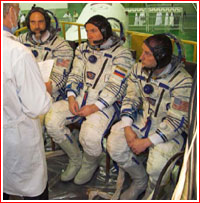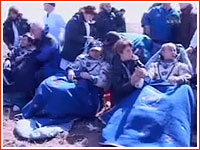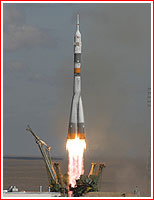Mission of Soyuz TMA-13 (original) (raw)
Previous mission: Soyuz TMA-12
The mission of the Soyuz TMA-13 (No. 223) spacecraft, taking off in the fall of 2008 had a goal of delivering and returning the 18th long-duration crew to the International Space Station. The launch of the Soyuz FG rocket was scheduled for Oct. 12, 2008. (In preliminary schedules, the mission was planned as early as September 2008). During the flight to the station, the Expedition 18 crew was joined by an American "spaceflight participant" Richard Garriott flying under a commercial agreement with the Russian space agency, Roskosmos. He would return to Earth with Expedition 17 after 12 days in orbit.
Expedition 18 crewmembers:
| Name | Status | Agency | Notes |
|---|---|---|---|
| Primary crew | |||
| Yuri Lonchakov | Soyuz Commander; Expedition 18 flight engineer | Roskosmos | - |
| E. Michael Fincke | Expedition 18 commander | NASA | |
| Sandra Magnus | flight engineer | NASA | Joins Expedition 18 in progress. She is to replace Greg Chamitoff during STS-126 in November 2008. |
| Koichi Wakata | Flight Engineer | Japan Aerospace Exploration Agency | Joins Expedition 18 in progress. He is to replace Sandra Magnus during STS-119 in February 2009. |
| Richard Garriott | Tourist | US, private | Up only; returns onboard Soyuz TMA-12. |
Russia delivers new crew to the station
Published: 2008 Oct. 12; updated Oct. 14
The new expedition heads to the International Space Station, ISS, after a successful launch from Kazakhstan.
The Soyuz FG rocket blasted off from Site 1 at Baikonur Cosmodrome on Oct. 12, 2008 at 11:01:33 Moscow Time (07:01:33 GMT), carrying the Soyuz TMA-13 spacecraft. Onboard were members of Expedition 18 Russian cosmonaut Yuri Lonchakov, NASA astronaut Michael Fincke, along with an American space tourist Richard Garriott. Garriott, a 47-old computer game developer and a son of NASA astronaut Owen Garriott, reportedly paid between $30 and 35 million for a 12-day ride in space.
After a two-day autonomous flight, the Soyuz TMA-13 successfully docked to the nadir (Earth-facing) docking port of the Zarya FGB control module of the station on Oct. 14, 2008, at 12:26:14 Moscow Time (08:26 GMT), just seven minutes ahead of schedule. Expedition 18 is expected to last 173 days, while Richard Garriott should return to Earth onboard the Soyuz TMA-12 with the members of Expedition 17.
Expedition 18 milestones (as of October 2008, according to NASA):
- 2008 Oct. 12 : Soyuz FG to launch Soyuz TMA-13 from Baikonur toward the ISS;
- 2008 Oct. 14: The Soyuz TMA-13 to dock with the nadir port of the Zarya FGB control module;
- 2008 Oct. 24: Undocking and landing of the Soyuz TMA-12 spacecraft with the members of Expedition 17;
- 2008 Nov. 14: Launch of Shuttle Endeavour on the STS-126/ULF-2 mission from Kennedy Space Center;
- 2008 Nov. 28: Docking of Endeavour to ISS Pressurized Mating Adapter-2 (PMA-2); Magnus and Chamitoff swap places as Expedition 18 crew members;
- 2008 TBD: Undocking of Progress M-65 (Mission 30P) from the aft port of the Zvezda service module;
- 2008 Nov. 26: Launch of Progress M-1M (Mission 31P) from the Baikonur;
- 2008 Nov. 29: Undocking of Endeavour from PMA-2
- 2008 Nov. 30: Docking of Progress M-1M (Mission 31P) to the Pirs Docking Compartment
- 2008 Dec. 1: Landing of Endeavour at the conclusion of STS-126/ULF-2
- 2008 Dec. 18: Russian spacewalk No. 21 by Lonchakov and Fincke out of the Pirs Docking Compartment;
- 2009 Feb. 9: Undocking of Progress M-1M (Mission 31P) from the Pirs Docking Compartment;
- 2009 Feb. 10: Launch of Progress M-66 (Mission 32P) from the Baikonur;
- 2009 Feb. 12: Docking of Progress M-66 (Mission 32P) to the Pirs Docking Compartment; launch of Discovery on the STS-119/15A mission from the Kennedy Space Center
- 2009 Feb. 14: Docking of Discovery to ISS Pressurized Mating Adapter-2 (PMA-2); Wakata and Magnus swap places as Expedition 18 crew members
- 2009 Feb. 23: Undocking of Discovery from PMA-2
- 2009 Feb. 26: Landing of Discovery to complete STS-119/15A
- 2009 March 25: Launch of the Expedition 19 crew and an Australian spaceflight participant on the Soyuz TMA-14 from the Baikonur;
- 2009 March 27: Docking of the Soyuz TMA-14 to the aft port of the Zvezda service module;
- 2009 April 5: Undocking of the Soyuz TMA-13 with Expedition 18 crew and an Australian spaceflight participant from the Zarya FGB control module and landing;
Station crew returns home
Published: 2009 April 8
Commander Mike Fincke and Flight Engineer Yury Lonchakov of the 18th International Space Station crew landed in Kazakhstan on April 8, 2009, at 3:16 a.m. EDT after about six months in space, NASA said.
With Fincke and Lonchakov was spaceflight participant Charles Simonyi. He launched to the station March 26, 2009, with the Expedition 19 crew, Commander Gennady Padalka and Flight Engineer Michael Barratt, under contract with the Russian Federal Space Agency.
Helicopter crews were able to videotape the final phase of descent of the Soyuz capsule, including the firing of the soft-landing engines and the touchdown. The capsule landed on its side after landing, probably due to strong winds in the area. A Russian recovery team and NASA personnel reached the landing site by helicopter shortly after. They helped the crew members into reclining chairs for medical tests and set up a medical tent nearby. All three people aboard the Soyuz TMA-13 spacecraft were reported to be in good condition after their re-entry and landing.
Japan Aerospace Exploration Agency (JAXA) astronaut Koichi Wakata came to the station aboard space shuttle Discovery on its STS-119 mission, launched March 15. He served for the last part of Expedition 18 as a flight engineer. He remains aboard the station as a member of the Expedition 19 crew. Wakata is the first resident station crew member from JAXA.
Expedition 18 crew members undocked their Soyuz spacecraft from the station at 11:55 p.m. EDT on April 7, 2009. The deorbit burn to slow the Soyuz and begin its descent toward the Earth took place at 2:24 a.m. on April 8, 2009.
When they landed, Fincke and Lonchakov had spent 178 days in space on their Expedition 18 flight, 176 of them on the station.
Fincke, a colonel in the U.S. Air Force, returned from his second stay at the space station. He previously served as flight engineer and NASA Space Station science officer on Expedition 9 in 2004. Lonchakov, a colonel in the Russian Air Force, completed his third trip to the station. He was a mission specialist on STS-100, which visited the orbital outpost in 2001, and he returned to the station in 2002 as part of the Soyuz TMA-1 crew.
Next mission: Soyuz TMA-14
This page is maintained by Anatoly Zak; Last update:May 5, 2012
All rights reserved
IMAGE ARCHIVE

The crewmembers are briefed on the preparations of the Soyuz TMA-13 spacecraft at Site-254 in Baikonur Cosmodrome, few days before their liftoff in October 2008. Credit: NASA
The Soyuz TMA-13 lifts off on Oct. 12, 2008. Credit: RKK Energia

Members of the Soyuz TMA-13 crew shortly after landing on April 8, 2009. Credit: NASA TV

